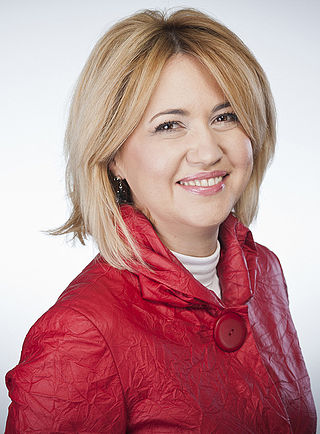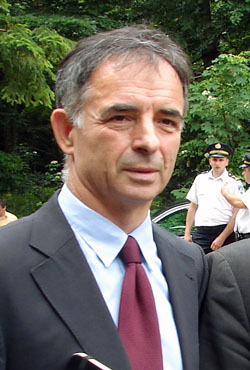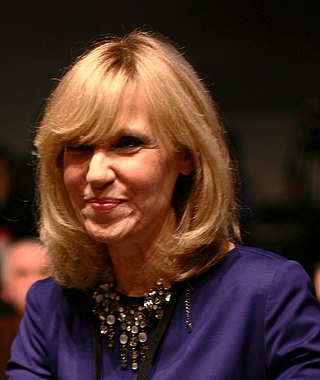
Ivica Račan was a Croatian politician who served as Prime Minister of Croatia from 2000 to 2003, heading two centre-left coalition governments.

The Social Democratic Party of Croatia is a social democratic political party in Croatia. The SDP is anti-fascist, progressive, and strongly pro-European. The SDP was formed in 1990 as the successor of the League of Communists of Croatia, the Croatian branch of the League of Communists of Yugoslavia, which had governed Croatia within the Socialist Federal Republic of Yugoslavia since World War II.
The Istrian Democratic Assembly is a centre to centre-left, regionalist, liberal political party in Croatia primarily operating in Istria County.

The Croatian Social Liberal Party is a conservative-liberal political party in Croatia. The HSLS was formed in 1989 as the first Croatian political party formed after the reintroduction of the multi-party system.

The Croatian People's Party – Liberal Democrats is a social-liberal political party in Croatia.

Antun Vujić is a Croatian politician, philosopher, political analyst, lexicographer and author serving as a director of the Miroslav Krleža Institute of Lexicography since 2012. He was a member of Croatian Parliament and Minister of Culture in the Croatian Government from January 2000 to December 2003.

Parliamentary elections were held in Croatia on 25 November 2007 and for overseas voters on 24 and 25 November. The campaign officially started on 3 November. The President of Croatia announced elections on 17 October and 14 days were allowed for candidate lists to be submitted.

Željka Antunović is a Croatian former politician who served as acting president of the Social Democratic Party between April and June 2007, and as Minister of Defence from 2002 until 2003 in the second cabinet of Ivica Račan. She was the first and to date only female holder of the office.

Ljubo Jurčić is a Croatian economist, current president of the Croatian Association of Economists since 2006 and former Minister of Economy from 2002 to 2003.
The Left of Croatia was a marginal leftist Croatian political party with no parliamentary representation.

Ivo Josipović is a Croatian academic, jurist, composer, and politician who served as President of Croatia from 2010 to 2015.

Parliamentary elections were held in Croatia on Sunday, 4 December 2011 to elect 151 members to the Croatian Parliament. They were the sixth parliamentary election in Croatia since independence.

Davor Bernardić is a Croatian physicist and politician who served as the president of the Social Democratic Party from 2016 to 2020. He also served as one of four SDP vice-presidents, leader of the SDP's Zagreb branch, and president of the SDP Youth Forum. Bernardić has been elected to the Croatian Parliament five times, representing the 1st electoral district.

Milanka Opačić is a Croatian politician who served as a Minister of Social Welfare and Youth at centre-left Cabinet of Zoran Milanović from 2011 to 2016. She served as one of four vice-presidents of the Social Democratic Party, the main centre-left political party in the Sabor. She was first elected to Sabor in the 1992 parliamentary election, and was reelected in 2000, 2003, 2007, 2011, 2015 and 2016.

Rivers of Justice is a centre-left political alliance in Croatia. Gathered around the Social Democratic Party of Croatia (SDP), the coalition was originally formed in 2010 as the Kukuriku coalition. This somewhat facetious name meaning 'cock-a-doodle-doo', taken from a restaurant of the same name in Kastav where the coalition leaders first convened in July 2009, became well known and was eventually taken as the coalition's official name. The coalition originally consisted of four centrist and centre-left parties in the Croatian Parliament: the Social Democratic Party of Croatia (SDP), Croatian People's Party – Liberal Democrats (HNS-LD), Croatian Party of Pensioners (HSU) and Istrian Democratic Assembly (IDS). The coalition won an absolute majority of seats in the 2011 parliamentary election and successfully formed a government led by Zoran Milanović (SDP).

Parliamentary elections were held in Croatia on 8 November 2015. All 151 seats in the Parliament were up for election. This parliamentary election was the 8th since the first multi-party election in 1990 and the first since Croatia joined the European Union in 2013. The ruling center-left Croatia is Growing coalition, led by Prime Minister Zoran Milanović, was challenged by the center-right Patriotic Coalition led by the HDZ and headed by its party chairman Tomislav Karamarko, and also faced several new political coalitions.

Milorad Pupovac is a Croatian politician and linguist. He is a member of the Sabor, the former president of the Serb National Council, and the president of the Independent Democratic Serb Party. He was also an observer at the European Parliament.
The Croatian Left has consisted of a broad range of individuals, groups, and political parties who seek egalitarian, economic, social and cultural rights in Croatia. Left-wing ideologies came to Croatia in the late 19th century during the Austria-Hungary regime. In 1894, the Social Democratic Party of Croatia and Slavonia was formed. It was the first workers party in Croatia at the time. In the Kingdom of Serbs, Croats and Slovenes the leftist movement grew but it was suppressed by the royal government. In 1920, the Communist Party of Yugoslavia was proclaimed illegal and its sympathizers were brutally persecuted after winning a large number of positions in the local elections. During the 1920s, Stjepan Radić and his Croatian Peasant Party led a centre-left agrarianism and anti-royalist policy. They were the leading Croatian political party at the time. After the assassination of Radić in 1929, the Croatian Peasant Party was taken over by Vlatko Maček who enforced a more conservative and nationalist rhetoric. During the Socialist Yugoslavia era, the League of Communists of Yugoslavia was the only legal party in the country. In 1990, political plurality was restored and a number of left-wing parties emerged with the most notable one being the Social Democratic Party of Croatia.

Ingrid Antičević-Marinović is a Croatian lawyer and former politician who serves as justice of the Constitutional Court of Croatia since 7 June 2016. She had previously served as a 9th Minister of Justice, Public Administration and Local Self-government in the center-left Cabinet of Ivica Račan II from 2001 to 2003. She was the first woman to serve as Justice Minister in Croatia as well as first woman lawyer in Zadar's history.

The Green–Left Coalition was a left-wing electoral alliance in Croatia represented by six MPs. It is presently composed of the We Can! – Political Platform and New Left, as well some localist political parties and platforms, such as Zagreb is OURS! and For the City movements from City of Zagreb and Srđ is the City! from Dubrovnik. It promotes democratic socialism, green politics, and progressivism on social issues.

















